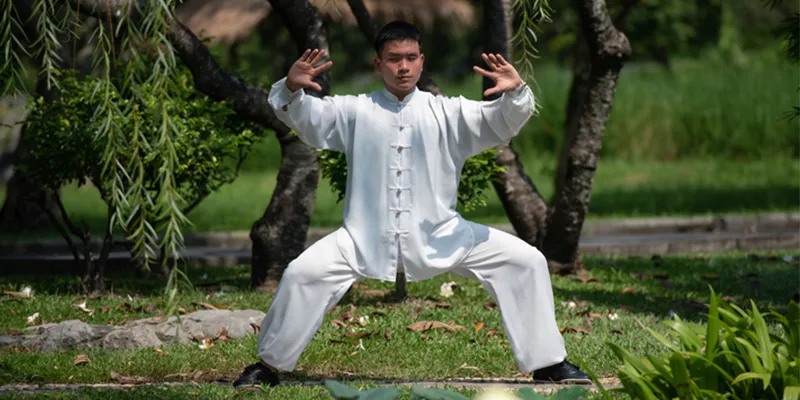
What Is Medical Qigong Training?
Medical Qigong Training (MQT) is a Traditional Chinese Medicine (TCM) practice that uses Qi regulation to prevent disease, treat illness, alleviate symptoms, and promote overall well-being in both self-care and clinical settings. Based on Traditional Chinese Medicine (TCM) physiology, pathology, and energetics, medical Qigong training encompasses Qigong guidance, breathing, mindfulness, meditation exercises, and massage or acupuncture for a comprehensive mind-body approach. It integrates physical movement, breath control, mental focus, and energy manipulation within a clinical framework.

What Is Qigong?
Qigong (pronounced “chee-gong”), with its roots in the principles of Traditional Chinese Medicine, Daoism, Buddhism, and Confucianism, operates on the foundational concepts of Jing Luo, the dynamic balance of Yin and Yang, the interaction of the Three Treasures, and the Wu Xing. It cultivates, balances, and harmonizes the body’s inherent life force through a comprehensive approach of movement, breathing, and focused thought.

This practice enhances physical function, promotes mental health, and fosters spiritual peace. Qigong has numerous styles, ranging from health preservation to martial arts and meditation, with the goal of prevention and self-healing, aiming to increase vitality, improve resilience to stress and disease, and promote a healthy lifespan.
While different from medical Qigong, Qigong is an important foundation of Traditional Chinese Medicine and can help maintain health, reduce stress, and enhance overall well-being through self-directed practice.
Medical Qigong Training Advantages
- Stress Reduction and Nervous System Regulation: Medical Qigong Training provides deep states of physiological relaxation and counteracts chronic stress responses. Through deliberate breath, focused intention, and specific postures/movements, it effectively downregulates the sympathetic nervous system while enhancing parasympathetic dominance. This leads to measurable reductions in cortisol levels, lowered blood pressure, decreased heart rate, and improved heart rate variability, creating an optimal internal environment for healing and reducing the burden of stress.
- Enhanced Pain Management: Medical Qigong training offers significant non-pharmacological tools for pain relief. Training focuses on altering pain perception pathways, reducing inflammation through improved circulation and neuroendocrine modulation, and releasing muscular tension. Medical Qigong practitioners learn to guide patients in using internal awareness and Qi movement to disrupt pain signals and activate endogenous opioid systems, providing a valuable adjunct or alternative for managing chronic pain conditions like fibromyalgia, arthritis, and neuropathic pain.

- Meridian Regulation: Medical Qigong Training equips practitioners to accurately diagnose Qi deficiencies, excesses, and stagnation within specific meridians and Zang-fu organ systems. They then apply precise interventions using breath, intention, movement, and external Qi projection to restore smooth Qi and blood flow, rebalance Yin and Yang, and strengthen the body’s vital substances, addressing the root energetic imbalances underlying dysfunction.
- Strengthened Immune Function and Resilience: Medical Qigong Training includes practices to strengthen the body’s defensive capabilities. Trainings focus on cultivating and strengthening Wei Qi, enhancing lymphatic circulation, modulating immune cell activity, and reducing chronic inflammation. This systemic enhancement of immune surveillance and response improves resistance to pathogens and supports recovery from illness.
- Improved Management of Chronic Conditions and Adjunctive Cancer Care: Medical Qigong Training provides evidence-based supportive care for complex chronic diseases. For oncology patients, specific protocols can effectively mitigate side effects of treatment, improve quality of life, potentially enhance treatment efficacy, and support emotional well-being. For conditions like hypertension, diabetes, autoimmune disorders, and chronic fatigue syndrome, it offers to manage symptoms, reduce medication reliance, and improve overall functional capacity.
- Holistic Integration: Medical Qigong Training simultaneously addresses physical symptoms, emotional states, and spiritual well-being. By reducing anxiety and depression, improving emotional regulation, fostering mindfulness, and promoting a sense of inner peace and connectedness, it supports comprehensive healing.
Qigong Advantages
- Cardiopulmonary Function: The deliberate, diaphragmatic breathing techniques central to Qigong enhance respiratory efficiency, vital capacity, and gas exchange. Concurrently, gentle, rhythmic movements improve peripheral and central circulation, lower resting heart rate and blood pressure, and optimize oxygen delivery to tissues. This effect bolsters cardiovascular health, augments cellular metabolism and energy production, and elevates overall endurance and functional capacity.
- Musculoskeletal Flexibility: Qigong’s slow, controlled weight-bearing postures and flowing movements promote joint stability and increase range of motion through dynamic stretching without undue strain. This strengthens connective tissues and musculature while improving postural alignment.
- Cognitive Enhancement: Qigong strengthens attentional control, working memory, and executive function. Also, it regulates limbic system activity, reducing symptoms of anxiety and depression, fostering emotional stability, and enhancing mood through neurochemical modulation.

- Immune System Modulation: Regular Qigong practice demonstrably influences immune competence. Studies indicate enhancements in natural killer cell activity, lymphocyte proliferation, neutrophil function, and salivary immunoglobulin A levels, alongside reductions in pro-inflammatory cytokines.
- Preventative Health: Qigong systematically cultivates and conserves Zhen Qi, enhances self-regulatory capacity, improves resilience to environmental stressors, and supports the functional harmony of organ systems. It delays the onset of degenerative processes, slows physiological aging markers, and promotes sustained functional independence and quality of life, effectively extending healthspan.
Medical Qigong Training vs Qigong: Similarity
Both systems are built on the ancient Chinese concept of “Qi.” Both aim to cultivate, balance, and harmonize this Qi as the core principle for feeling good and functioning well.
They use the same basic tools: gentle movements or postures, deep breathing, and focused attention or meditation. Whether for general health or specific treatment, practitioners rely on combining these three elements—body, breath, and mind.
Through both practices of coordinating their movements with their breath and focusing their attention, practitioners in both traditions learn to calm mental chatter, reduce stress, improve body awareness, and promote a deep sense of relaxation and inner balance.

Both Medical Qigong and general Qigong share their fundamental ideas and theories with Traditional Chinese Medicine. Concepts like Yin and Yang, the Wu Xing, and the function of the body’s organ systems according to TCM are important background knowledge for understanding and practicing both approaches.
While medical qigong specializes in treatment, both systems strongly value preventing illness and maintaining good health. Regular practice of any Qigong is believed to strengthen the body’s natural defenses, improve resilience to stress, boost energy levels, support healthy organ function, and promote longevity.
Medical Qigong Training vs Qigong: Difference
Qigong is a practice of personal wellness, preventive health, and self-cultivation. Individuals engage in Qigong to maintain balance, reduce stress, enhance vitality, improve flexibility, and foster a general sense of mind-body harmony through regular self-practice. Medical Qigong Training, however, is a clinical therapeutic modality within Traditional Chinese Medicine. Its primary purpose is the assessment, diagnosis, and treatment of specific illnesses, injuries, or dysfunctions. Medical Qigong training aims to identify energetic imbalances associated with a patient’s medical condition and apply targeted interventions to restore health. Its focus is explicitly clinical and curative.
In Qigong, the practitioner and the beneficiary are the same person. Individuals learn and do Qigong exercises on their own behalf for self-care and self-improvement. Conversely, medical qigong training inherently is a practitioner-patient therapeutic relationship. A clinically trained medical Qigong practitioner acts upon a patient. The MQP assesses the patient’s condition, makes a TCM diagnosis, and then applies specific therapeutic techniques to the patient or prescribes personalized exercises for the patient.

Learning Qigong typically involves studying standard forms, sequences, breathing, and principles of self-regulation. This can be acquired through classes, workshops, books, or videos, often without requiring formal medical knowledge. Medical Qigong Training, however, demands extensive, professional-level clinical education. This includes in-depth study of anatomy, physiology, Western and TCM pathology, differential diagnosis, disease processes, advanced Qi manipulation theory and techniques, ethics, and clinical internships.
While both may involve breath, movement, and mind focus, the range of techniques differs significantly. Qigong practitioners perform postures, movements, breath control, and meditation/mind focus to cultivate and regulate their own Qi internally. Medical Qigong Training, however, incorporates both self-practice techniques prescribed to the patient AND external techniques applied by the practitioner. They project or direct therapeutic Qi externally into the patient’s body or energy field. They also use specialized hands-on or off-the-body techniques to purge pathogenic factors, tonify deficiencies, regulate organ systems, or clear meridian blockages based on their clinical diagnosis.

Qigong practice usually involves learning and performing standardized sets or forms. It’s commonly practiced in community centers, parks, studios, or homes. Medical Qigong Training, in contrast, is highly individualized medicine. The MQP conducts a thorough assessment and creates a tailored treatment plan specific to the patient’s unique TCM diagnosis, medical condition, constitution, and treatment goals.
Conclusion
In essence, Medical Qigong Training (MQT) and Qigong share a common foundation in Traditional Chinese Medicine’s principles of Qi cultivation, mind-body integration, and holistic well-being, yet serve distinct roles in health management. Qigong is a self-directed practice, focusing on preventive care by enhancing cardiopulmonary function, flexibility, cognitive resilience, and immune strength. It is accessible to all as a daily wellness ritual. Conversely, medical qigong training is a clinical discipline, where trained practitioners diagnose energetic imbalances and apply targeted therapies.



